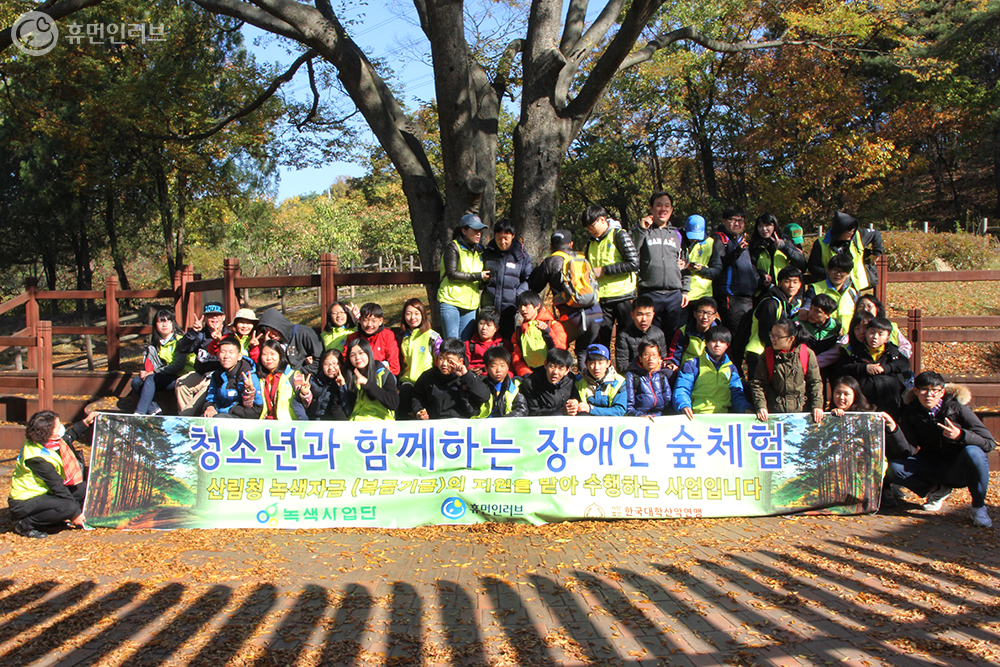On Oct. 31, HUMAN IN LOVE launched the “Forest Walking Experience of the Disabled with Teenagers” with 19 mentally challenged teenagers, who applied for the forest walking experience through Seoul Jungjin School for mentally disabled students and St. Peter’s School, and 25 volunteer workers including middle and high school students. The event was sponsored by lottery fund and joined by a Korean mountain federation, KSAF.
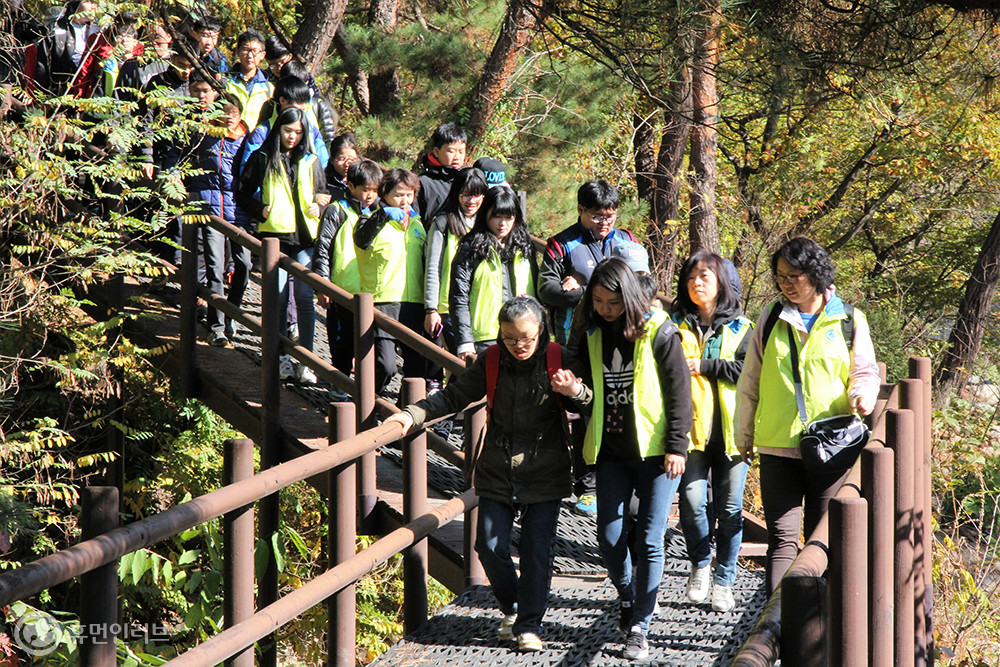
[ Disabled students and volunteers are walking Mt. Bukhan Trail at the “Forest Walking Experience of the Disabled with Teenagers” event ]
::Students with Little Experience of Meeting the Mentally Disabled
Mt. Bukhan Trail was the place of the event. Participants gathered at Daerim, Yeongdeungpo and Gupabal Stations where they can be picked up. As the festival took place on Saturday, many middle and high school students participated. Some were very enthusiastic while others looked very sleepy or were concentrating on smart phone games. As such, the volunteers were all different, but there was one thing in common: they have never met mentally disabled people in person.
Mentally challenged teenagers came to the pick-up stations with their parents. Some parents repeatedly told the guides about the characters of their sons and daughters, or some kept waving hands and called the names of their sons and daughters until the bus left. In the bus, we grouped partners according to gender, degree of disability and physique.
Not long after we left, one of our concerns became a reality. A 17-year-old student In-hyeok (false name) with severe autistic disorder started to tremble and scream and held the back of the bus seat tight, afraid of being with strangers. Safety was in concern, and we tried to calm him down and let him get back to his seat, but it did not work. Other disabled teenagers also started to show anxiety, and volunteers were also taken aback.
We urgently changed partners and asked Song, Jin-u, a student with good physique, and Kim, Yeong-jae, a student who acted calmly, to be partners with In-hyeok. The two students calmly hold hands and body of In-hyeok without startling him and parted from the back of the seat. A mother of another mentally disabled teenager, who was in the bus, soothed In-hyeok as well.
::Various Types of Disorder Behaviors and Ways to Communicate
In the bus, the mentally disabled teenagers and volunteers made partners one-on-one or one-on-two, but the situation was different as soon as we got off the bus. The disorder behaviors of the 19 mentally disabled teenagers were all different, so it was hard to control them. The volunteers seemed embarrassed. One disabled student started to slam the doors of a car parked along the forest trail, and another one ran into a flower garden. In-hyeok sat on the ground, and another student who had the biggest build grabbed a sports equipment and did not let it go. The beginning of the event did not go smoothly, and we had to repeat walking and waiting.
The forest trail of the event was called the “Naesimyoyeok Trail” which stretches 3.5km with almost no slopes. We walked the trail, looking at the graceful shape of the mountain and coloring leaves.
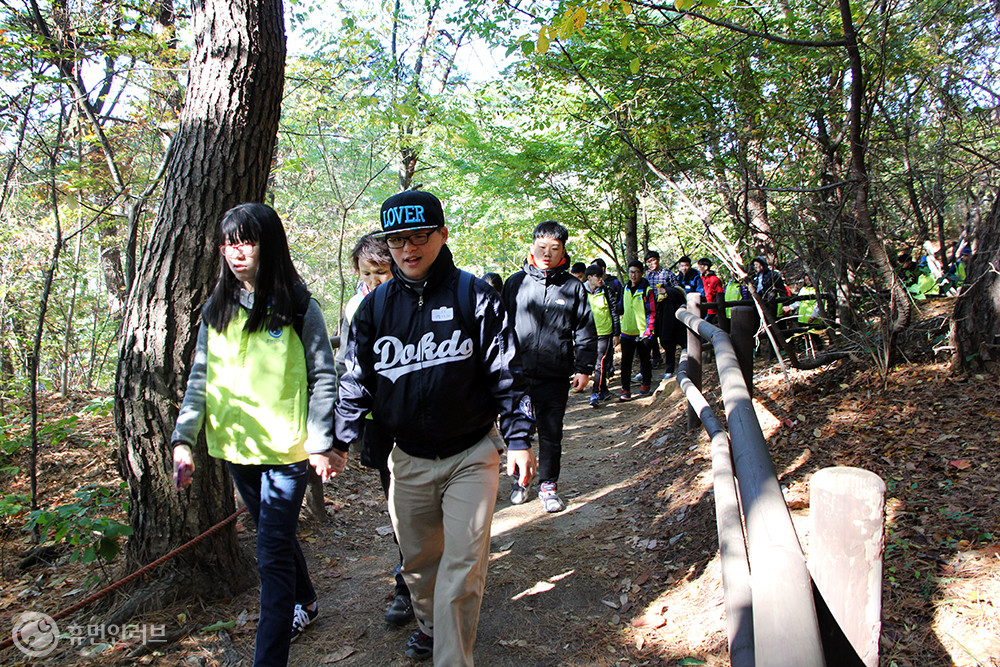
[ Participants are walking the “Naesimyoyeok Trail ]
The single path of the forest trail made the participants closer. The mentally disabled teenagers and volunteers continued their conversation with their hands held or arm in arm. In case a person has autistic disorder, he/she has his/her own world, so it is difficult for him/her to contact eyes or communicate with other people. Also, same behaviors or words are repeated. However, the repeated behaviors or words can be the key for starting a conversation with a mentally disabled person. At the event, there was a mentally disabled teenager who only repeated the word “Banana Kick,” which is the name of a snack in Korea, and did not move. So, a volunteer used the word to communicate with the teenager. The volunteer said, “I also like Banana Kick. Let’s eat one if we reach that point.” As soon as the volunteer told this, the teenager started to walk.
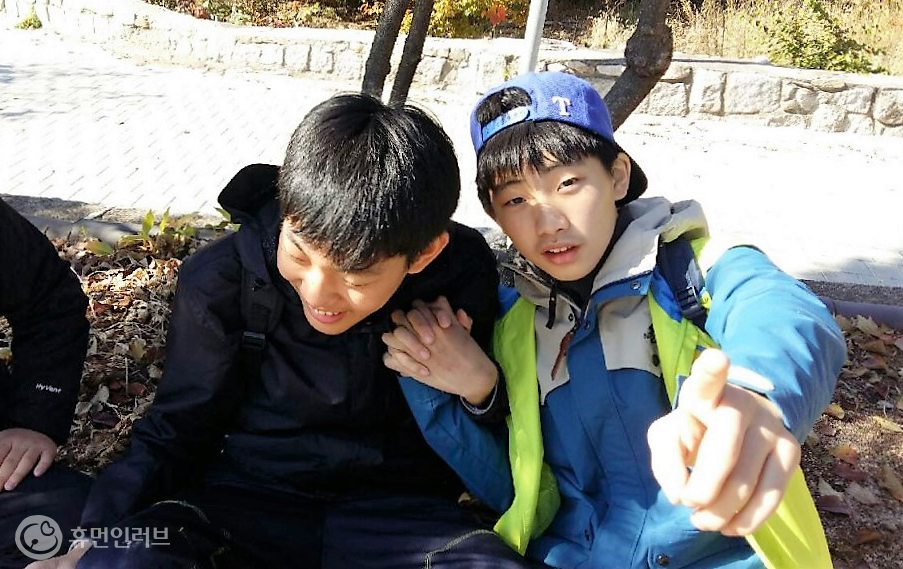
[ Jeong-min (false name/18 years old) and volunteer worker Heo, Hyeok ]
Meanwhile, volunteer worker Heo, Hyeok, who parted with a four-year elder mentally disabled teenager, was also very impressive. Whenever Jeong-min (false name), his 18-year-old partner, searched for his mother, Hyeok was not irritated or did not neglect him. He calmly explained the situation to Jeong-min, saying, “Jeong-min, you can meet your mother if you walk to the end of this trail. I know you can make it,” or “I am sure your mother wants you to eat well.” Thanks to Hyeok’s kind explanation and encouragement, Jeong-min was able to walk the full forest trail without mental stress.
As the mentally disabled teenagers and volunteers got closer to each other half way to the end of the trail, a mission was given. The mission was to take a photo together and send it to the parents of the mentally disabled teenagers who would worry about their children.
::Meaningful Company that Changes Our Thoughts
”“I helped In-hyeok just for about two hours, but his family has to take care of him always. I believe that is possible because they are families. I think if this kind of events are held more frequently and more people participate in the events, we can get rid of the prejudice against the disabled.”
– Volunteer worker Song, Jin-u-
”At first, the mentally disabled teenagers showed unexpected behaviors such as climbing up the bus seat or throwing shoes, maybe because they were afraid of strangers. I was worried that I could get hurt. However, as time passed, we put arms around each other’s shoulders, held hands together and I saw In-hyeok smiling. As we got closer, I knew that In-hyeok was very nice and I felt like he is my little brother. I also thought that In-hyeok must have faced prejudice just because of his disability.”
– Volunteer worker Kim, Yeong-jae-
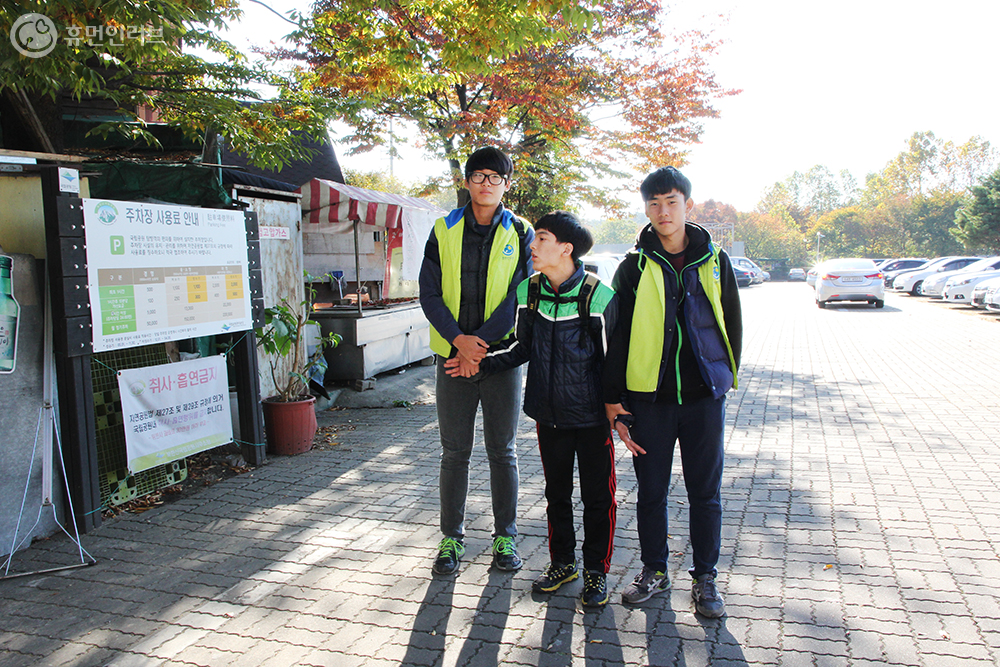
[ (From the left) Volunteer worker Song, Jin-u; In-hyeok (false name/17 years old); Volunteer worker Kim, Yeong-jae ]
Finally, the bus arrived at the pick-up place again. The volunteers got off the bus, and the parents of the disabled teenagers brought their sons and daughters back home. One of the fathers said, “My sweet little boy, here you are!” and wore a big smile when he found his son. The son was one of the teenagers difficult to take care of during the walking. By looking at his father, we once again felt that the disabled teenager is also a beloved child of his parents.
People who do not have any knowledge of or experience with people with disabilities are embarrassed, startled, cautious or sometimes even irritated when being with the disabled. The disabled are also very uncomfortable or can show sense of uneasiness when faced with such responses, and in case of mentally challenged people, they can display abnormal behaviors.
By holding events joined by the disabled, people can have a chance to step closer to the disabled and have a conversation with them, which will cast away the prejudice against them. And, non-biased attitudes towards the disabled will bring about changes to family members, friends and neighbors as well.
